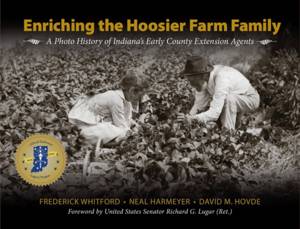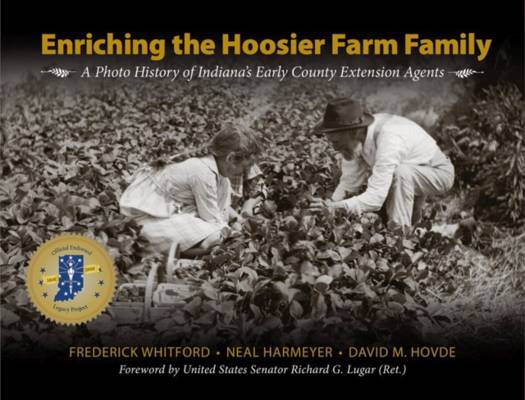
Je cadeautjes zeker op tijd in huis hebben voor de feestdagen? Kom langs in onze winkels en vind het perfecte geschenk!
- Afhalen na 1 uur in een winkel met voorraad
- Gratis thuislevering in België vanaf € 30
- Ruim aanbod met 7 miljoen producten
Je cadeautjes zeker op tijd in huis hebben voor de feestdagen? Kom langs in onze winkels en vind het perfecte geschenk!
- Afhalen na 1 uur in een winkel met voorraad
- Gratis thuislevering in België vanaf € 30
- Ruim aanbod met 7 miljoen producten
Zoeken
Enriching the Hoosier Farm Family
A Photo History of Indiana's Early County Extension Agents
€ 49,95
+ 99 punten
Omschrijving
Imagine Indiana farms at the turn of the last century. What comes from the land sustains us. Our farms and families depend on it. Having a good or bad year can mean the difference between prosperity and your family going hungry. Farmers knew how to provide. Throughout the 1800s, parents had passed their best knowledge on to their sons and daughters, who in turn taught their children tried-and-true methods for managing a farm--methods that provided consistency in a world of droughts, disease, and fluctuating markets. Before they abandoned a hundred years of proven practices or adopted new technology, they would have to be convinced that it was in their best interest. Enter county extension agents. Indiana county extension agents took up their posts in 1912, at a crucial juncture in the advancement of agriculture. The systematic introduction of hybrid seed corn, tractors, lime, certified seed, cow-testing associations, farm bureaus, commercial fertilizers, balanced livestock diets, soybeans, and 4-H clubs were all yet to come. Many of the most significant agricultural innovations of the 1900s, which are commonplace today, were still being developed in the laboratories and experimental fields of land-grant colleges like Purdue University. Compiled from original county agent records discovered in Purdue University's Virginia Kelly Karnes Archives and Special Collections Research Center, Enriching the Hoosier Farm Family includes hundreds of rare, never-before-published photographs and anecdotal information about how county agents overcame their constituents' reluctance to change. They visited farmers on their farms, day after day, year after year. They got to know them personally. They built trust in communities and little by little were able to share new information. Gradually, their practical applications of new methodologies for solving old problems and for managing and increasing productivity introduced farmers and their families to exciting new frontiers of agriculture.
Specificaties
Betrokkenen
- Uitgeverij:
Inhoud
- Aantal bladzijden:
- 320
- Taal:
- Engels
- Reeks:
Eigenschappen
- Productcode (EAN):
- 9781557537430
- Verschijningsdatum:
- 15/05/2016
- Uitvoering:
- Hardcover
- Formaat:
- Genaaid
- Afmetingen:
- 315 mm x 236 mm
- Gewicht:
- 2177 g

Alleen bij Standaard Boekhandel
+ 99 punten op je klantenkaart van Standaard Boekhandel
Beoordelingen
We publiceren alleen reviews die voldoen aan de voorwaarden voor reviews. Bekijk onze voorwaarden voor reviews.








